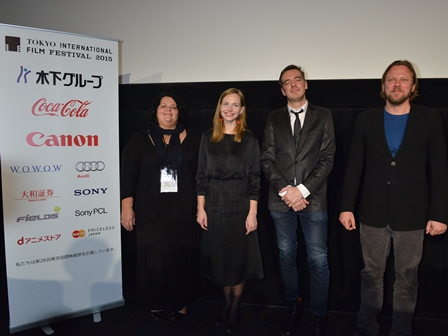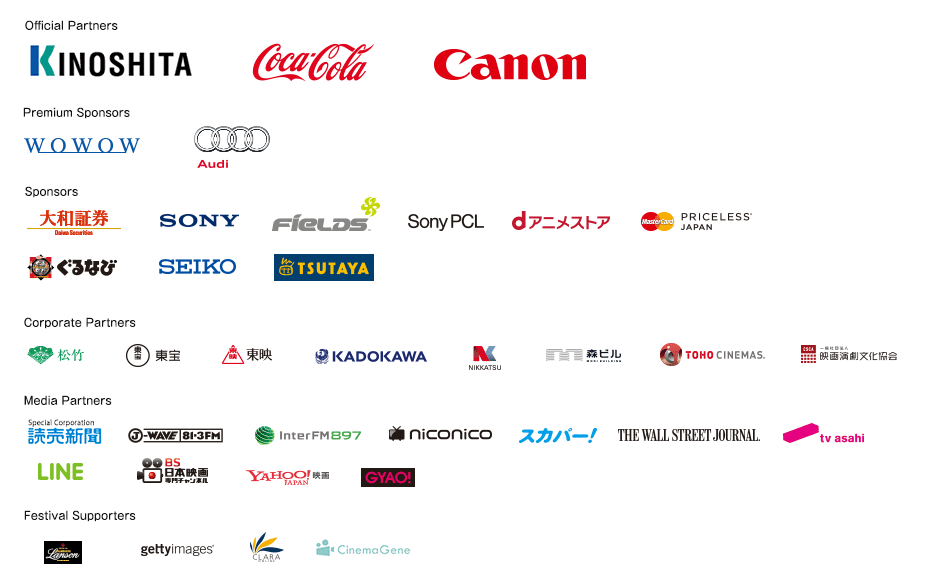Representing the Unknown – Roukli

Roukli imagines an unspecified future where a war starts in a city. For a handful of folks, living in the countryside, though not directly affected by the war, their lives are turned into turmoil. Issues come to the surface. Their fears and unresolved problems become the focuses of their lives. Their futures are thrown into uncertainty. Director Veiko Õunpuu and his small cast creates a tense world, where lives and emotions are laid bare, where the uncertainties of existence are called into question in an austere and abstract exploration at the boundaries of cinema. Roukli is playing at the Tokyo International Film Festival as part of the Competition section. Õunpuu came to Tokyo with his producer, Tiina Savi and two very talented actors from their production, Juhan Ulfsak and Mirtel Pohla. They talked about many aspects of the film, from its conception and its funding to its essential meaning.
When asked about his inspiration for making the film, Õunpuu revealed that it came about because of an important event.
“It started a year a half ago and it was a very tense moment when Russia invaded the Ukraine and the Crimean peninsula. In the Baltic countries we could feel this tension tangibly. And all of a sudden, the possibility of war was a certain reality -a feeling of terror. Everybody felt that. It was almost unreal. So this was maybe the starting point. I wanted to make a film really fast. We decided not to do it the usual way – to apply for the funding and so on. So we did it with crowd-funding and with very little money. It was a sort of experiment with the production as well. There were 6 actors and 7 crew members – all together 13 people – and we just started to work on it with a very sketchy script, at the same time trying to understand if it’s possible to make a film this way at all.”
The film came together quickly. Producer Tiina Savi explained, “When we started the film, I think Veiko handpicked all the crew – and in that sense the project was created by him. But the whole process from the idea to making it to the big screen took only one year. We did all the shooting with crowd-funding, which was only 16,000 Euros. And then post production we got financed by the Estonian Cultural Endowment, so the budget was only 45,000 Euros. It was a very small budget.”
Veiko added. “Actually we managed to do it with such a little [amount of] money because everybody worked for free. Everybody is an equal shareholder in this adventure.”
To which Savi continued, “It means that whatever we make at the box office we will all share equally, the 6 actors and the 7 crew members.”
When asked about some of the difficulties and pleasures about acting in this rather unconventional production, Juhan Ulfsak said, “Of course it’s always there are some hard moments and if you want to do your job well, [but] it felt very true. You are professional actor and you need to act, so it takes some time to go really into the situation. And I understood it took time and I was very happy that I had this time. This movie [was] more process-wise and more intuitive. We didn’t have [to] hurry.”
To which, actress Mirtel Pohla added, “Everything wasn’t in the script, which is now on the screen, but it somehow had [such] strong symbols, based on religion or shamanic traditions. In a way it leaves a space for the imagination of the actor or the actress. And also I believe it leaves a space for the spectators and that’s what I like the most.”
Ulfsak continued, “We used different techniques. We improvised some scenes as a group. And then some text we played. Some text we created. Some scenes the camera rolled and we continued and continued. For me, as an actor, it had been my dream to work like this. I used to work in theater. We threw away this classical way of doing things – to analyze the text and then act it. And [in] this way of working there were both difficulties and good things. The good things, of course, I hope were somewhere near truth, more authentic. But as an actor, what’s hard is… we end the work when it’s good enough.” He added with a laugh, “And as I know Veiko, it’s never good enough.”
Õunpuu talked about the larger meaning of the film. “Basically the film is about, in a very general way, a human condition. In the face of death, in the face of destruction, we don’t know the answers. So it’s a very difficult subject to approach, because whenever you provide the specific answer it feels as if you are actually diminishing [it] with your explanation. So, the task was to create this kind of premise where you would start to think about certain things, but without providing an answer – and also without providing a standard outcome of a story. So it would leave you in this strange sense of being nowhere, in a way. So this was the thought behind it. And I think it actually started to generate while we were doing it and the sense of it should be done like this – that it would be improper to come to a very specific conclusion.”
He talked about the reception to the film. “The reaction was… divided. There are people who loved and there were people that just completely hated it. A lot of people felt it [was an] unnecessary artistic endeavor. But, in general there have been a surprisingly large amount of viewers who have enjoyed it. I don’t know if the others agree with me” he said turning to his compatriots, “but we hope to entertain – in a very particular way” he added with a wry smile.
When queried about the meaning of the title, he revealed its origin and mused on its larger significance in relation to the film. “Roukli is an oak forest near where I live. There are a lot of legends attached to the place. It used to be a sacred ground during pre-Christian times. There are a lot of legends attached to it. [The local people] don’t want you to go there. They don’t go there themselves. It’s this strange place. It has this mystery about it. Within a film context, let’s just say it’s unknown. It just represents the unknown. And it’s good to have a name that doesn’t mean anything to signify the unknown.
He concluded with more musings and associations as to what he was trying to accomplish and express with Roukli. “It was an unbelievably organic and sort of flowing experience. The question in my mind was: What is it to be an artist? What does it mean? What can we offer? So to me personally, in terms of specific discourse, the artist can’t offer that much – in terms of arguing about politics or how specifically certain things should be. What we can do is try and be very personal and spontaneous and inspired. It was an attempt to completely shun the business side and to try and be as loose as possible in everything. I think we succeeded in that in terms of the process. What the outcome for everyone else is [for themselves] to judge – if it suits their purposes or not or if it even resembles a film or not. But it was for us just this flow of things and a wonderful experience.”
[Nicholas Vroman]























